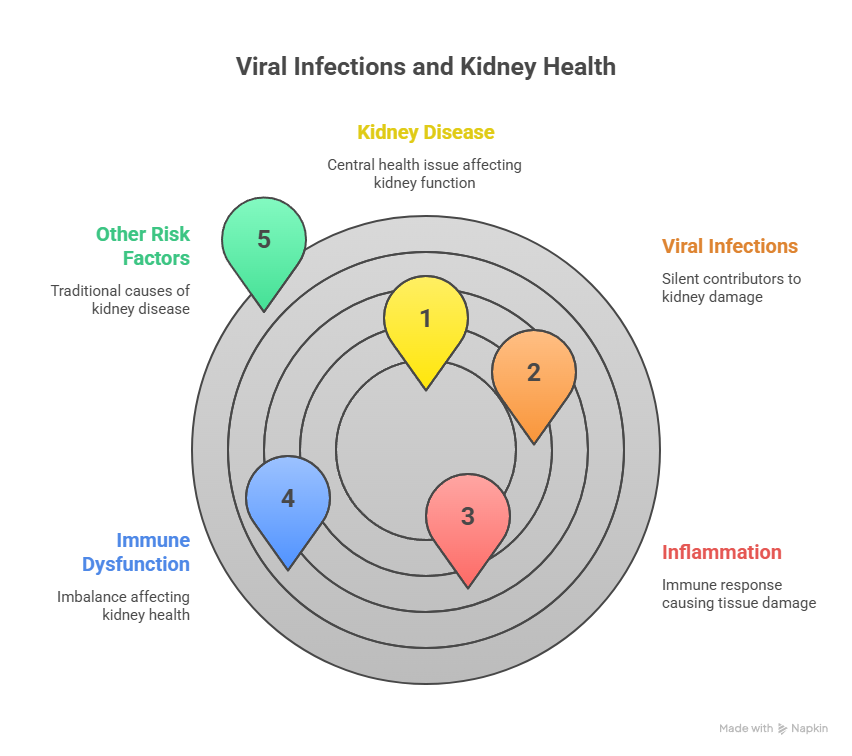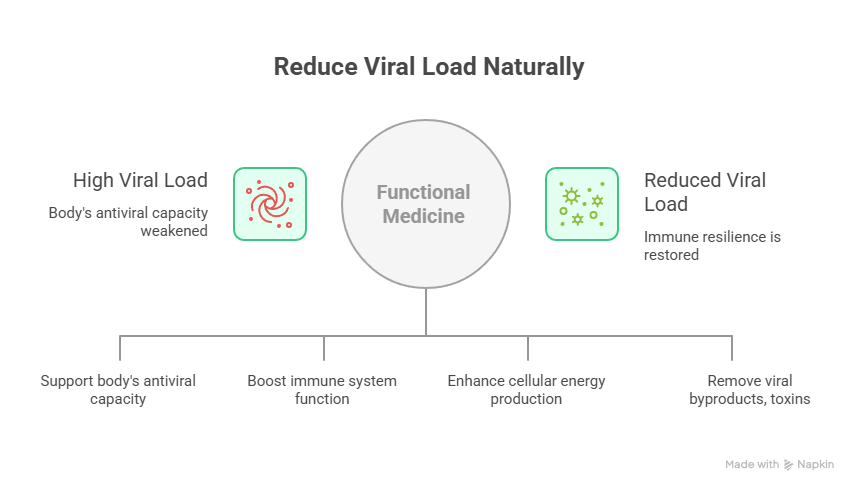
When we think of kidney disease, the usual suspects come to mind, high blood pressure, diabetes, genetics, or even medication overuse. But what if there was a hidden, silent contributor often overlooked in both conventional medicine and public awareness?
Viral infections.
That cold you had years ago, the flu that left you exhausted for weeks, or a seemingly minor stomach virus might not be entirely behind you. For some individuals, these infections can linger beneath the surface, silently wreaking havoc on vital organs, especially the kidneys.
In a powerful episode of Wellness Focused, Dr. Bismah Irfan, MD, a functional nephrologist, shines a light on the underrecognized link between viruses and kidney disease. She explores how certain viruses may persist in kidney tissue long after the acute infection has passed, triggering inflammation, immune dysfunction, and even permanent damage.
This blog explores the emerging science, the mechanisms at play, and most importantly, how you can take a proactive, personalized approach to protecting your kidney health, especially if you suspect your immune history may hold clues to current symptoms.
Why Viruses Matter in Kidney Health
Most people think of viruses as short-term illnesses. You get sick, your immune system fights back, and then it’s over. But not all infections follow that neat, linear path.
Some viruses are stealthy. They evade immune detection, hide inside tissues, and persist for months or years. In the process, they can quietly fuel chronic inflammation, confuse the immune system, and interfere with normal cellular function.
In kidney health, these lingering effects can be deeply damaging. They may contribute to the onset or progression of chronic kidney disease (CKD) even in individuals with no clear risk factors.
Dr. Irfan describes this hidden infection connection not to create fear, but to empower. Because once we understand what’s truly driving kidney dysfunction, we can make smarter, more effective choices to reverse it.
The Lingering Impact of Viral Infections
There’s growing recognition that viruses can remain in the body long after the acute symptoms are gone. Some reside quietly in tissues, including kidney tissue, where they cause low-grade inflammation that slowly wears down organ function.
For example, viruses like Coxsackie, Epstein-Barr, CMV, and even influenza have been associated with post-infectious kidney dysfunction. Some of these viruses directly infect kidney cells; others simply leave behind a chronic inflammatory response that never fully resolves.
It’s not always about having a full-blown viral illness. Even a mild case of a virus, especially if your immune system was already overwhelmed or your detox systems were sluggish, can set the stage for hidden complications down the road.
The kidneys, with their dense vascular network and complex immune interactions, are particularly vulnerable to this lingering viral impact.
How Viruses Damage the Kidneys
The connection between viral infections and kidney injury isn’t just a theory. It’s rooted in several well-documented biological mechanisms. Let’s break down how this can happen:
1. Direct Viral Invasion of Kidney Cells
Some viruses directly infect the cells of the kidneys, especially the tubular epithelial cells and glomerular cells (like podocytes). Once inside, the virus hijacks the cell's machinery to replicate itself, damaging the cell in the process.
This can lead to:
- Cell death and tissue injury
- Disruption of the filtration barrier
- Leakage of protein into the urine
- Impaired electrolyte and fluid balance
Even if the immune system eventually clears the virus, the damage done in the meantime can be lasting, especially if the process repeats with multiple infections over time.
2. Misdirected Immune Responses
The immune system plays a double-edged role in viral kidney injury. While it’s designed to fight infection, in some cases it overreacts or gets confused, attacking the body’s own tissues in the process.
This phenomenon is often called molecular mimicry, where parts of the virus resemble parts of your kidney cells. The immune system, in trying to eliminate the virus, accidentally attacks healthy kidney tissue.
The result? Autoimmune-like damage, chronic inflammation, and a breakdown of self-tolerance, all of which can lead to progressive kidney dysfunction.
3. Persistent Viral Reservoirs and Chronic Inflammation
Some viruses, like Epstein-Barr or CMV, can go into a latent phase, essentially hiding in your body, avoiding detection, and reactivating when conditions are right (such as during stress, nutrient depletion, or immune suppression).
This smoldering infection fuels chronic low-grade inflammation, which is one of the core drivers of kidney fibrosis, vascular damage, and glomerular sclerosis.
It’s not about one big infection, it’s about years of slow, steady wear and tear, often without overt symptoms.
4. Disruption of Cellular Function and Repair Mechanisms
Viruses can also interfere with how cells regulate themselves, replicate, and repair. This disruption of normal kidney cell function can lead to:
- Impaired healing from injury
- Oxidative stress and mitochondrial dysfunction
- Altered gene expression within kidney tissue
- Accelerated tissue aging and loss of resilience
All of this adds up over time, especially in people who have multiple infections, high toxin exposure, or underlying immune dysfunction.
Why Some People Get Sick and Others Don’t
One of the most frustrating aspects of viral kidney injury is its unpredictability. Two people can be exposed to the same virus, yet one recovers fully while the other develops chronic symptoms or kidney disease months later.
This is where biological individuality comes into play.
Dr. Irfan emphasizes that we are not all wired the same. Our genetics, immune history, nutrient status, toxin load, gut microbiome, and stress levels all affect how we respond to infections.
Some individuals have robust antiviral defenses. Others have sluggish detox systems or weakened immune responses that allow viruses to linger and create long-term damage.
That’s why a personalized approach is critical. Instead of looking for a one-size-fits-all solution, we must evaluate what’s happening inside your body, and design a healing plan that matches your unique needs.
Functional Medicine’s Role in Uncovering Hidden Infections
Conventional medicine often stops looking for answers once the obvious tests come back normal. But in functional medicine, we dig deeper.
Dr. Irfan explains that uncovering viral-related kidney injury requires an investigative mindset, looking for patterns, not just lab values.
Some of the functional clues that might indicate a hidden viral burden include:
- History of frequent viral illnesses
- Long recovery times from infections
- Chronic fatigue or brain fog
- Unexplained inflammation markers
- Persistent proteinuria or hematuria with no clear cause
- Coexisting autoimmune conditions
- Poor response to standard kidney disease treatments
Through advanced testing and clinical insight, functional providers can detect signs of viral activation, immune dysregulation, and inflammatory patterns that point to a deeper root cause.
And the goal is not just to label it, but to change it.
A Comprehensive Plan to Address Hidden Viral Triggers
So what can you do if you suspect that past infections may be affecting your kidneys? Here’s how Dr. Irfan approaches it within a functional framework:
1. Test, Don’t Guess
Identifying hidden infections is the first step. This may include:
- Viral antibody panels
- Immune profiling (T-cell activity, cytokine levels)
- Inflammation markers like CRP and IL-6
- Oxidative stress and mitochondrial function
- Gut health assessments (since 70% of the immune system lives there)
The more we understand your current immune terrain, the better we can support it.
2. Support Immune Regulation
A healthy immune system doesn’t just fight, it knows when to stop. Many people with viral-related kidney issues have an immune system that’s stuck in overdrive or confusion.
Dr. Irfan may use strategies to:
- Balance Th1/Th2 immune responses
- Improve gut-barrier function to reduce immune overactivation
- Support natural killer cell activity
- Calm autoimmunity through targeted nutrients and lifestyle tools
It’s about creating immune intelligence, not just stimulation.
3. Reduce the Viral Load
While some viruses can’t be fully eradicated, they can be brought back into dormancy. This is where functional medicine truly shines, supporting the body’s natural antiviral capacity.
This may involve:
- Antiviral botanical compounds
- Nutritional cofactors like zinc, selenium, and vitamin D
- Mitochondrial support
- Detoxification of viral byproducts and related toxins
By reducing the viral load and restoring immune resilience, inflammation calms and healing can begin.

4. Repair the Kidneys from Within
Once the immune system is stabilized, Dr. Irfan focuses on cellular regeneration and kidney repair using personalized tools such as:
- Anti-inflammatory diets
- Targeted amino acids and peptides
- Herbal nephroprotective compounds
- Gut-healing protocols
- Mind-body techniques to lower stress and improve vagal tone
Every intervention is chosen not just for the disease, but for you, your symptoms, your labs, and your story.
A Message of Hope
The idea that a viral infection from years ago could still be affecting you today might feel overwhelming. But it’s also liberating.
Because once you identify this hidden trigger, you’re no longer stuck managing symptoms in the dark. You have a target, and with the right approach, a path to healing.
Dr. Irfan’s work in functional nephrology reflects a broader truth: your body is not broken. It’s brilliant. It’s doing the best it can with the information and resources it has. When we remove the blocks, like persistent viruses, and replenish what’s missing, healing is not just possible. It’s expected.
Final Thoughts
If you’ve been told your kidney disease is idiopathic (without a known cause), or if you’ve always sensed something deeper was at play, it may be time to explore the infection connection.
Viruses are stealthy, but they’re not stronger than your body’s healing wisdom.
With the guidance of a trained functional practitioner like Dr. Bismah Irfan, you can uncover the hidden root causes of your symptoms, restore immune harmony, and give your kidneys the support they need to thrive, naturally, holistically, and powerfully.
Your healing begins when your story is heard. And it’s time to tell the whole story.
